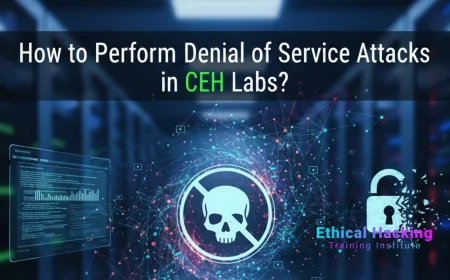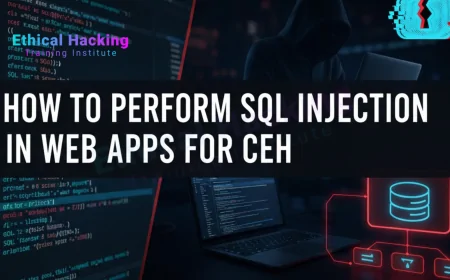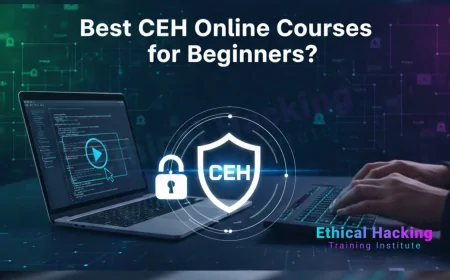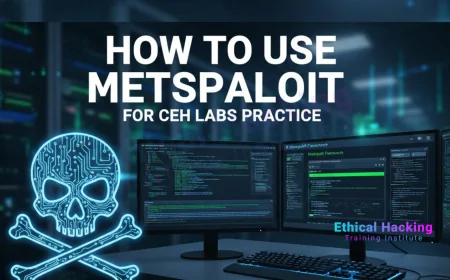CEH Certification Training: A Comprehensive Guide to Preparing for the Exam | How to Prepare for CEH Certification: A Step-by-Step Training Guide
Get fully prepared for the CEH exam with this detailed guide on CEH certification training, syllabus, study tips, costs, labs, and FAQs.
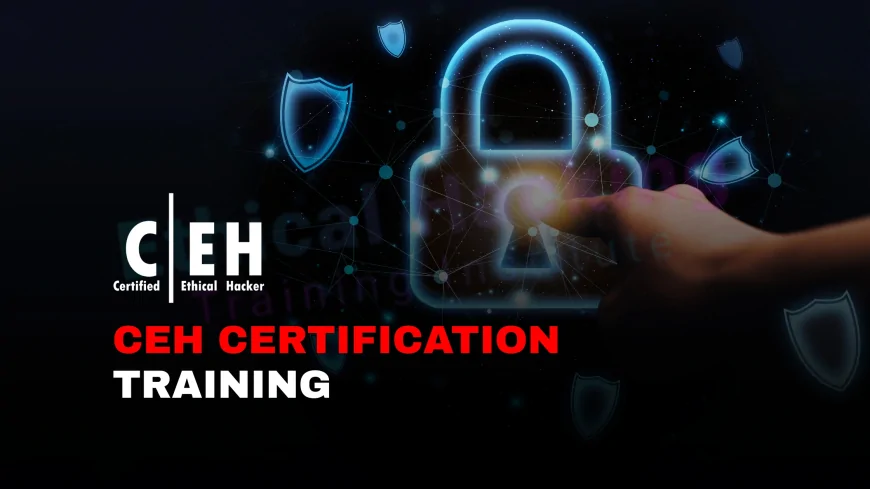
Table of Contents
- Introduction to CEH Training
- Why Specialized Training Matters
- Overview of the CEH Exam
- Eligibility Requirements
- Types of CEH Training Paths
- Core Training Content & Syllabus
- Hands-On Lab Environment
- Effective Study Strategies
- Practice Tests & Mock Exams
- Exam Time Management Tips
- What to Expect on Exam Day
- After Certification: Next Steps
- Additional Learning Resources
- Training Costs & Budgeting
- Common Mistakes to Avoid
- Frequently Asked Questions
- Conclusion
Introduction to CEH Training
The Certified Ethical Hacker (CEH) certification—offered by EC-Council—validates your expertise in ethical hacking methodologies, tools, and techniques. Specialized training ensures you build the right mindset, practical skills, and readiness for the challenging exam.
Why Specialized Training Matters
Preparing for the Certified Ethical Hacker (CEH) exam isn't just about reading theory—it's about understanding how to apply cybersecurity concepts in real-world situations. Specialized CEH training provides structured learning, access to industry-grade tools, and hands-on labs that mimic live environments.
Unlike generic cybersecurity courses, CEH-authorized training aligns precisely with EC-Council’s current exam blueprint (v13). This ensures you’re studying only what’s relevant to the exam, such as footprinting, system hacking, enumeration, web vulnerabilities, and more.
- Instructor-Led Guidance: Learn from certified professionals who clarify complex topics and offer expert insights.
- Lab-Based Learning: Reinforce theoretical knowledge by actively exploiting systems in legal environments like iLabs or Hack The Box.
- Time-Saving: Structured curriculum saves you months of scattered self-study by organizing topics efficiently.
- Exam Readiness: Specialized training includes mock tests, scenario walkthroughs, and exam simulations to boost your confidence.
Whether you're a complete beginner or an IT professional looking to upgrade your skills, specialized CEH training dramatically increases your chances of passing the exam and succeeding in cybersecurity roles.
Overview of the CEH Exam
- Exam Code: 312-50
- Questions: 125 multiple-choice questions
- Time Limit: 4 hours
- Passing Score: Typically 60–85%
- Delivery: Online via Pearson VUE or EC-Council’s iLabs portal
Eligibility Requirements
To take the CEH exam, you must either:
- Complete EC-Council–authorized training (no prior experience needed), or
- Have at least 2 years of experience in InfoSec and apply through EC‑Council to gain exam eligibility.
Types of CEH Training Paths
- Official EC-Council iClass: Live online sessions, labs, structured schedule
- Accredited Training Centers (ATCs): Authorized Training Centers (ATCs) offer instructor-led sessions either on-site or in a blended learning format.
- Self-Paced Learning: Recorded sessions + lab access + exam voucher
- Third-Party Platforms: WebAsha—accredited options available
Core Training Content & Syllabus
Learners in the CEH course will engage with various modules like:
- Footprinting & reconnaissance
- Network scanning & enumeration
- System hacking & malware analysis
- Web application hacking (XSS, SQLi, CSRF)
- Wireless, IoT, cloud security
- Evading IDS/IPS and honeypots
- Cryptography and security policies
Hands-On Lab Environment
CEH training emphasizes real-world, hands-on exercises as a core part of the learning process.Theoretical knowledge alone isn’t enough—real-world application of hacking techniques is what sets certified ethical hackers apart.
EC-Council iLabs, the official lab platform, provides a cloud-based environment where learners can simulate attacks, test exploits, and practice remediation in a safe, legal setting. iLabs includes over 140 exercises aligned with CEH v13 objectives, covering topics such as reconnaissance, system hacking, malware analysis, and more.
In addition to iLabs, many learners supplement their training with platforms like:
- WebAsha Labs: Localized, instructor-backed labs integrated with CEH training modules.
Hands-on labs enhance your learning by helping you build real-world muscle memory in scanning, enumeration, exploitation, and post-exploitation techniques. They also prepare you for performance-based assessments in advanced certifications like CEH (Practical).
Key Features Highlighted:
-
Emphasizes iLabs (EC-Council’s official lab)
-
Adds popular alternatives (WebAsha)
-
Explains why hands-on training is essential for CEH success
Effective Study Strategies
- Create a study schedule mapping topics to daily goals
- Pair theory reading with immediate lab application
- Join study groups and CEH-focused forums
- Keep a vulnerability scrapbook—document CVEs, exploits, and mitigation
- Stay current with cybersecurity news and threats
Practice Tests & Mock Exams
Use practice platforms like Boson, ExamLabs, and EC‑Council’s official mock exams. Weekly timed drills help improve both knowledge retention and exam pacing.
Exam Time Management Tips
- Answer all easy questions first, flag uncertain ones for later review
- Manage time per section—do not spend too long on a single question
- Use the process of elimination on tough questions
- Reserve final 15 minutes to revisit flagged questions
What to Expect on Exam Day
Ensure stable internet, clean camera feed (if remote), and proper ID for Pearson VUE. For labs-based exams, have your virtual lab ready. Follow exam rules strictly to prevent disqualification.
After Certification: Next Steps
- Add CEH credential to your professional profiles
- Apply for roles like ethical hacker, penetration tester, or security analyst
- Gain more certifications such as CEH (Practical), OSCP, or CISSP
- Earn 120 ECE credits over 3 years to maintain your certification
Additional Learning Resources
- Books: *CEH All-in-One* by Matt Walker, *Official CEH Study Guide*
- Blogs & CVE feeds: Krebs on Security, OWASP, MITRE
- Communities: InfoSec Twitter, Reddit's /r/CEH, Discord study groups
- Podcasts & webinars: Darknet Diaries, EC‑Council events
Training Costs & Budgeting
| Package | What's Included | Approx. Cost (₹) |
|---|---|---|
| Exam Voucher Only | CEH Exam | ₹40,000–₹50,000 |
| Self-Paced Training | Recorded videos + voucher | ₹50,000–₹60,000 |
| Official Training (iClass/ATC) | Live classes + labs + voucher | ₹55,000–₹70,000 |
| Premium Bootcamp | Mentorship + exam attempt + career support | ₹75,000–₹120,000 |
Common Mistakes to Avoid
- Studying theory without labs
- Delaying mock exams until last week
- Not logging mistakes and review
- Ignoring updates in CEH v13 syllabus
- Skipping post-exam analysis and reflections
Frequently Asked Questions (FAQs)
1. What is the best way to train for CEH?
Official EC-Council training or accredited ATC training with labs is highly recommended.
2. Can I prepare for CEH through self-study?
Yes, self-study with books and lab subscriptions works well if you're disciplined and experienced.
3. How important are labs in CEH training?
Labs are critical—they reinforce theory and help build practical hacking skills.
4. What is iLabs?
iLabs is the EC-Council’s virtual training platform for live hacking labs included in official CEH training.
5. Is EC-Council iClass worth it?
Yes—iClass provides live instruction, deeper interaction, and immediate exam eligibility.
6. Which is better: live or self-paced training?
Live training offers mentorship and schedule; self-paced training is more flexible and cost-effective.
7. How much study time is recommended?
Plan for at least 3 months of consistent study and lab practice to thoroughly prepare.
8. Do I need coding for CEH?
Basic scripting knowledge (Python/Bash) helps, but CEH mainly focuses on tools and methodology.
9. Can I take the exam remotely?
Yes, EC-Council offers remote proctoring through Pearson VUE or EC-Council’s exam portal.
10. How many times can I retake the exam?
You can retake it as per EC-Council policy, subject to exam retake fees.
11. How do I schedule my exam?
Exam scheduling is done through EC-Council’s Aspen portal or via Pearson VUE.
12. What’s the passing score for CEH?
It varies by exam form—typically between 60% and 85%.
13. Are there age or educational prerequisites?
No, but experience or official training is required to qualify for the exam.
14. How is CEH different from OSCP?
CEH is broader with theory and tools; OSCP is more technical and hands-on in penetration testing.
15. How do I renew my CEH certification?
Earn 120 Continuing Education (ECE) credits and pay the annual maintenance fee.
16. Can CEH lead to government job eligibility?
Yes—CEH meets DoD compliance standards and is valued by government employers.
17. What is CEH v13?
It’s the latest version with updates on cloud, IoT, MITRE ATT&CK, and modern threats.
18. Should I take CEH before OSCP?
For many, CEH provides a strong foundation, after which OSCP offers deep technical training.
19. Is there any job support after CEH?
Yes—many training providers offer resume help, interview prep, and networking support.
20. How can I stay updated after certification?
Join security communities, read blogs, subscribe to threat feeds, and practice in labs regularly.
Comprehensive CEH certification training—with structured learning and lab-based practice—greatly enhances your readiness for the exam and future career. Use this guide to choose your training, manage study plans, and pass the exam with confidence.
Conclusion
What's Your Reaction?
 Like
0
Like
0
 Dislike
0
Dislike
0
 Love
0
Love
0
 Funny
0
Funny
0
 Angry
0
Angry
0
 Sad
0
Sad
0
 Wow
0
Wow
0






